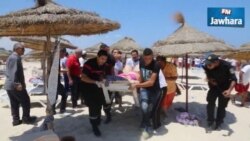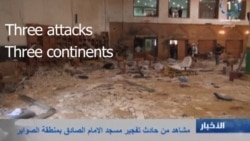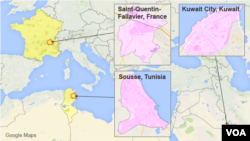World leaders joined in their condemnation of three terror attacks across three continents Friday that left dozens dead in the space of a few hours.
The White House described the assaults in Tunisia, Kuwait and France as heinous. “Terrorism has no place in any society,” it said in a statement released shortly after the assaults.
— In the Tunisian attack, two gunmen stormed a beach near the Imperial Marhaba hotel in Sousse, killing 37 people, including British, German and Belgian nationals, and wounding 36.
Officials said security forces responded to the attack, and that at least one gunman was killed. Another fled.
— In Kuwait, a suicide bomber blew himself up in a crowded Shia mosque in Kuwait City, killing at least 25. An Islamic State-affiliated group known as Najd Province said it carried out the attack at the Imam Sadiq Mosque, and that it was responsible for similarly deadly attacks at two Shi'ite mosques in Saudi Arabia in recent weeks.
The Islamic State group considers Shi'ite Muslims to be heretics.
— And in France, attackers crashed a car into a U.S.-owned gas company in Saint-Quentin-Fallavier, southeast of Lyon, then beheaded a businessman, leaving his decapitated body daubed with Arabic writing at the entrance of the premises. A flag with Islamist inscriptions was also found nearby.
French Interior Minister Bernard Cazeneuve said a suspect, identified as Yassine Salhi, 35, a married father, had lived in the Lyon area and been under surveillance between 2006 and 2008. Authorities said he did not have a criminal record but was known to have had links to Salafist Muslims. Four other people were held for questioning.
Coordinated attacks?
“Those responsible for these appalling acts of violence must be swiftly brought to justice,” said U.N. Secretary-General Ban Ki-moon.
In a statement on its Twitter feed the Islamic State took credit for the attack on the Tunisian beach resort and named the gunman as Abu Yahya al-Qayrawani. Earlier in the day, the group also claimed responsibility for the Shi'ite mosque bombing.
Pentagon officials said it was not clear if all three attacks were planned and coordinated by Syria- and Iraq-based Islamic State forces.
One U.S. official said the attacks “bear the hallmarks that have defined ISIL’s violent ideology or those inspired by such hatred,” using an Islamic State acronym. “Terrorists could look to the attacks, recent ISIL leadership statements, or other markers — such as last year’s declaration of its so-called caliphate — to spur additional violence.”
The killings came just three days after an Islamic State spokesman called on the group’s followers to carry out attacks against all “infidels” during the Muslim holy month of Ramadan, which started June 17.
Christopher Chivvis, associate director of the RAND International Security and Defense Policy Center, said it was important that the attacks were different in nature.
“For France, this shows that France is not only targeted by al-Qaida but also by Islamic State,” Chivvis said, referring to the Charlie Hebdo magazine attacks earlier this year that left 12 dead.
“The attacks in Tunisia are important because Tunisia is the final remaining linchpin of security in North Africa," he said. "It’s the only state that’s maintained a democracy after the Arab Spring, but the Islamic State clearly has it in its sights. And in the case of Kuwait, it’s obviously an important American ally in the region, so it should be a concern that it’s been targeted by the Islamic State."
Taking credit
Michael Pregent, adjunct lecturer on international security affairs at the National Defense University, said that while it would be a mistake to assume that all three attacks were coordinated by the Islamic State group, the group could easily claim credit.
“They’ve basically given license to anybody to claim affiliation with ISIS when they carry out a terrorist attack, even though there is no formal affiliation,” Pregent said, using another of the group’s acronyms.
“If you do anything in the name of ISIS, that’s good. ISIS doesn’t have to spend money on your operation, ISIS doesn’t have to coordinate it, ISIS doesn’t have to do anything, but they get credit for these things,” Pregent told VOA.
Many Islamic State experts had been expecting an Islamic State Ramadan offensive inside Iraq, possibly geared at fomenting a full sectarian war in the country.
Pregent said that because Iraqi forces and militias had ratcheted up their security for the holy month, ISIS may have switched its focus to easier-to-hit, soft targets abroad, such as the mosque in Kuwait.
Few strategic gains
Regardless of the horror factor of the three assaults, Pregent said ISIS did not gain much strategically from the attacks. He added that the violence did not compare with the 2005-06 Ramadan campaigns of its predecessor, al-Qaida in Iraq.
“It is not impressive compared to what al-Qaida was able to do," he said. "In 2005, you had 56 attacks a day in Baghdad, 56 attacks a day: car bombs, kidnappings, assassinations.”
But Jeff Moore, CEO of Muir Analytics, a company that provides terror and insurgency risk assessments for corporations worldwide, said there is a rising trend of global Islamist terror attacks against soft targets that governments have to start grappling with.
“There is an Islamist jihadist saying, ‘Why take on a lion when there are plenty of lambs around to be slaughtered?,' and this is part of that trend,” said Moore.
“We have a whole swath of terrorists that are willing to go after soft targets, and governments haven’t quite gotten to the point where they are increasing security to the degree that it needs to be increased, and neither, quite frankly, is the hotel and resort community worldwide,” he added.
VOA's Jeff Seldin and Katherine Gypson contributed to this report.








